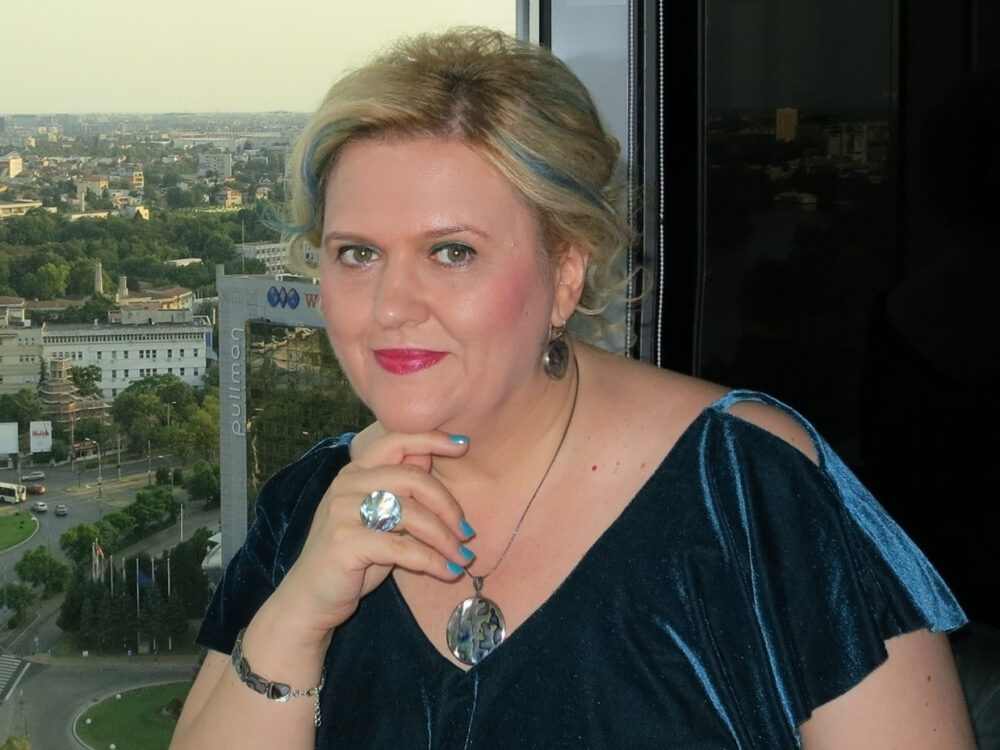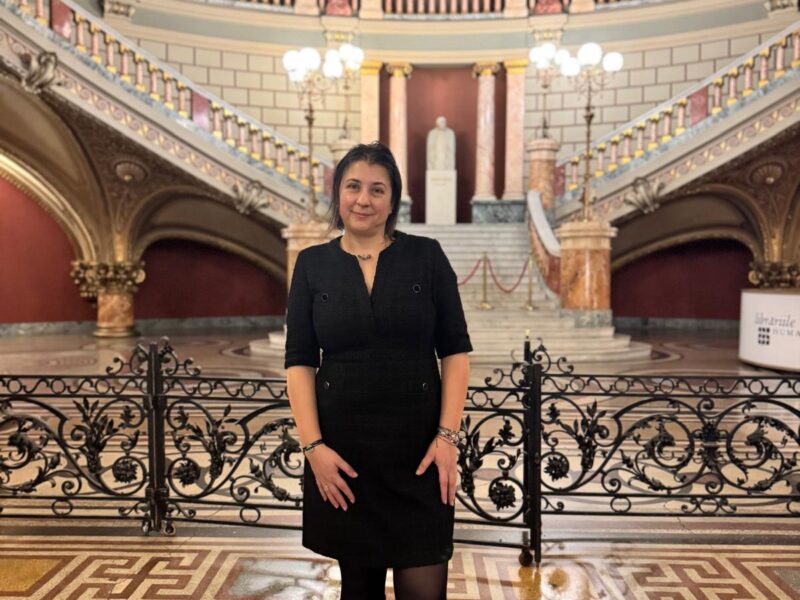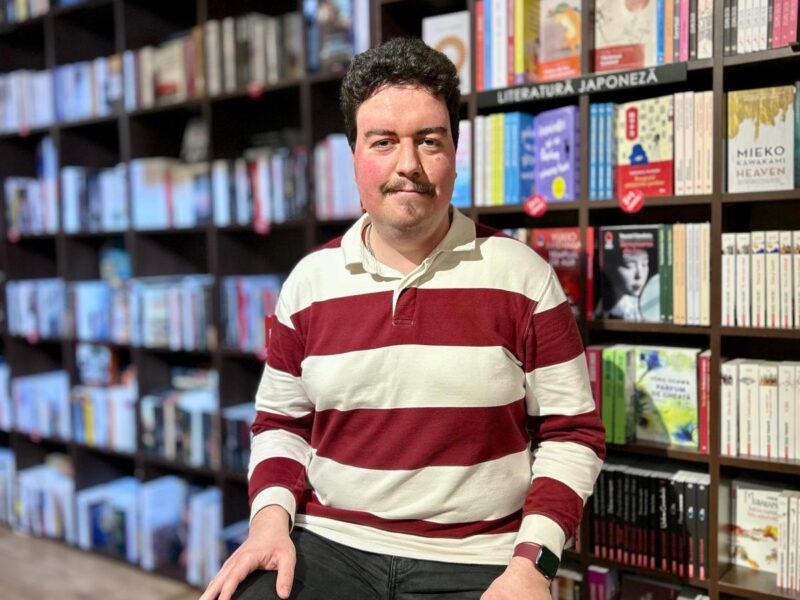Marilena Iovu is a literary agent, having founded in 2014 and currently running the Marilena Iovu Literary Agency, which liaise the sale of copyrights from clients abroad (especially in Germany) to publishers in Romania. She studied flute at a music school, graduated from the Academy of Economic Studies, worked in foreign trade and in 2002 entered the publishing world, being part of ALL Publishing Group team for twelve years. In her spare time, she turns another passion of herself into profession, translating from German and English. Enjoying both books and people, Marilena has the extraordinary ability to turn her business partners into friends and the other way around, combining professional reliability with an enthusiasm as elegant and gleeful as the sound of the flute.
What are the superpowers of a literary agent?
They are multi-tasking and hold the secret to ubiquity. They read an email within seconds of receiving it and reply or forward it instantly, send electronic manuscripts as quickly as they can to the publisher who requested them, writing down the title in the submissions table, forward incoming offers immediately, draw up or check contracts and invoices while recording them in the contracts table, promptly send payment reminders and newsletters, read incoming manuscripts thoroughly and at length while answering telephone enquiries from publishers. A literary agent is always up to date with what's new in the field. Apart from that, they have time for hobbies, social media, hanging out with friends and family life. Hahahaha!
What does your working day look like?
Weekday or weekend? 
What did your beginnings in the publishing world look like?
It was a happy turn of events. In 2002 I answered a job advertisement from ALL Publishing for their external relations department. I was used to international contracts, I had attended trade fairs abroad and corresponded with foreign partners before, I was fluent in three languages, but I knew almost nothing about the activity of a publishing house! I remember being asked at the interview, among other things, if I knew what a copyright notice was, and I naively replied: it's something written on the first few pages of the book. The The foundation of my current work was laid at ALL : there I learnt how to handle international copyright contracts,received training in the field and attended specialist courses and book fairs (in Frankfurt, London, Turin). My first task in the publishing house: keeping track of the copyright contracts in force. The first success: shortly after I was hired, I cleared an import of books that was stuck in customs. I had worked in a foreign trade company, clearing ships and trucks, therefore co-editions, which were difficult to understand and manage at the time, seemed like a piece of cake to me. Gradually, I got to understand the organisation of a publishing house. Through the nature of the job, I worked closely with the accounting department — my colleagues taught me the specific legislation and technical aspects of external invoices. I learned what editors, proofreaders, marketing and sales departments do. I dealt with the literary agencies and understood why they are important. At ALL I think I had the most good-hearted managers, Carmen and Mihai Penescu, and the greatest and most cheerful staff. I still keep in touch with the current and former ALL employees, even though we have scattered to the four winds. Years afterwards, I was still using the phrase: "at ALL we used to...”. It was difficult getting mentally detached from the work in the publishing house.
You said once that you worked on a project that trained people for the publishing industry. That sounds really, really good. Could you please tell me a few details about what that was like? It might give ideas to others.
I was part of the ProEdit team, an EU funds programme, run between 2010 and 2013 by the Romanian Publishers Union, through which employees of the publishing houses benefited, at no cost, from specialized courses and exchanges of experience abroad. Conferences and workshops were also organised, both for publishing workers (on topics such as textbooks, ebooks, copyright, proofreading, public relations, distribution, economic management) and for those in related fields — booksellers, librarians, etc. Guides and specialised handbooks were produced and distributed for free in publishing houses. At ProEdit, as an organizer of internal and external events (I emphasise, in addition to my work at ALL), I was making contact with foreign and Romanian lecturers to support working sessions or conferences in Romania and I was setting up the smallest details of the exchanges abroad (there were five such events, with groups of 20 or even 40 publishers, with whom we travelled to Frankfurt and Paris, participating in book fairs in Paris and Montreuil, in lectures with foreign lecturers, visiting the French National Library and traditional bookshops, participating in working sessions with foreign specialists).
At that time I was extremely busy, having two demanding jobs and working day and night. Although the project covered the costs of accommodation, transport and food, it was quite difficult to convince people to attend events. However, at the end of the three years, I was glad to see that the trainings held, this time for a fee, at the National ProEdit Centre were well attended. The reason is that ProEdit looked good not only on the paper, but also in reality, providing exactly the expert training in publishing that was so badly needed. Alongside the attendees, I gained an enormous amount of knowledge and broadened my horizons a lot: the ProEdit programme aimed to train 1000 employees in the publishing and related fields, so I met some of the staff of the publishing houses involved, librarians, booksellers and readers. They have listed the ProEdit workshops on their CVs and are still using some of the guidebooks published there (e.g. The Proofreader's Guide and The Desktop Publisher's Guide). They are still recounting what they learned there, at over 8 years after the end of the project.
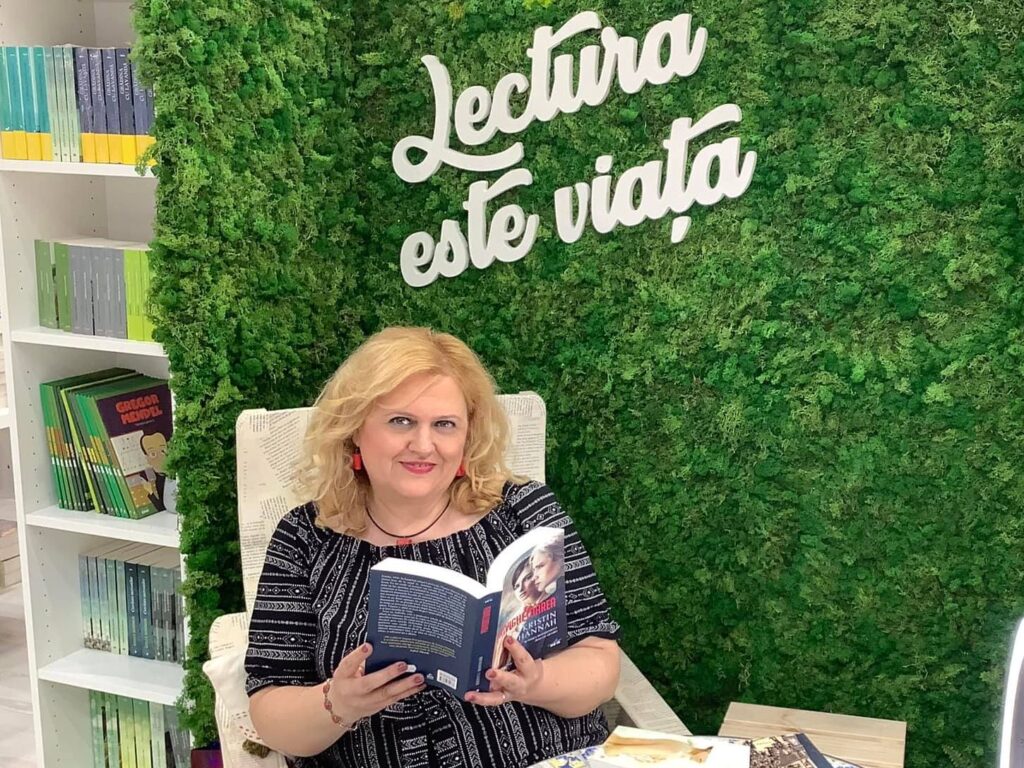
How did you make the transition to your own business? You've mentioned in other interviews about taking over the representation roster of an agent who decided to focus on a different business.
It's a story of light and shadow; I left ALL unexpectedly due to an incomprehensible decision made by the publishing house. The ProEdit project was also coming to an end. However, I couldn't see myself doing anything in the future other than dealing with licensing contracts, that was what I enjoyed most. I was working very closely with Sabina Boerescu, who had a small literary agency and represented almost exclusively German publishers. ALL publishing house had purchased translation rights for several titles in her portfolio, including the famous Pixi series. At the beginning of 2014, Sabina decided to quit the literary agent business in order to focus solely on specialist translations from German, which brought her steady income without so much hassle. She proposed that I should take over the agency's portfolio of clients and contracts. It was an opportunity I didn't hesitate to seize: I was going to do what I most enjoyed on my own and I wasn't starting from scratch. From the book fairs I was personally acquainted with the agents of several foreign publishers I was about to represent and I had the advantage of being familiar with all the local publishing industry's leaders from ProEdit. I took the legal steps, all under Sabina's guidance. At Bookfest in 2014 I was cheerfully handing out my literary agent business cards. What else was there to do? Just convincing my publishing acquaintances to become my business partners.
So you started with a portfolio of customers you were already representing. How did you continue to develop this and what exactly are the main criteria for choosing the clients you represent?
My good fortune was that the German publishers I had taken over were well-known names, particularly for children's books, but also for non-fiction. I wrote to all of them and thankfully most of them agreed to let me keep representing them, only a few went to other agencies. I expanded my portfolio at the first Frankfurt fair I attended as an agent, where I found that some German publishers specialized on children's books had no agent for Romania. There were situations where they had worked directly in the past [without an agent, ed.]] and had various unresolved issues (unshipped complimentary copies, unsent sales reports), which I dealt with at the beginning. I was then recommended to others by the publishers I represented. Another way to enlarge my portfolio was through daily activity: some Romanian publishers requested certain books and asked me to mediate the relationship with the foreign publisher as an agent. My portfolio has grown reaching now about 65 foreign publishers and agencies represented in Romania, 80% of which are for children's and young people's literature. So the main criterion is specialisation. I am not looking to extend my portfolio, I usually turn down requests for collaboration due to lack of time: I do everything by myself. After the most recent fair in Bologna, one more foreign publisher was added to the list by accident (a scheduling mix-up at a stand where two publishers were exhibiting). Technically, I also represent Romanian authors, but in practice I haven't yet succeeded in selling rights for any book, however I'm still trying!
Do you remember the first titles for which you sold rights and how it happened?
I remember that with great pleasure, it was a continuation of my activity at ALL publishers, I was now working with them as an agent, not as an employee. Sabina had submitted the first volume of the Rico and Oskar seriesfrom Carlsen, for which I had applied to Traduki and ALL had received funding. So that was the first contract I liaised, followed by a Pixi series title in the series also started at ALL. I did a contract for an adult novel from a Czech agency for Curtea Veche Publishing as well, which they had requested. This was followed by two mandala books for Litera Publishing, on which we had a groundbreaking speed first (which has occurred a number of times over the years): the offer was made on Monday, and by Friday the files were already approved and sent to the printer. Anyway, the first year of business (actually a few months) was a success, by the end of December I had closed eight contracts and all invoices were paid. This gave me confidence and hope that things would go the same way in the future. It's true that the publishing world warmly welcomed me. However, I haven't ended any other year with the performance of having all the receipts up to date since.
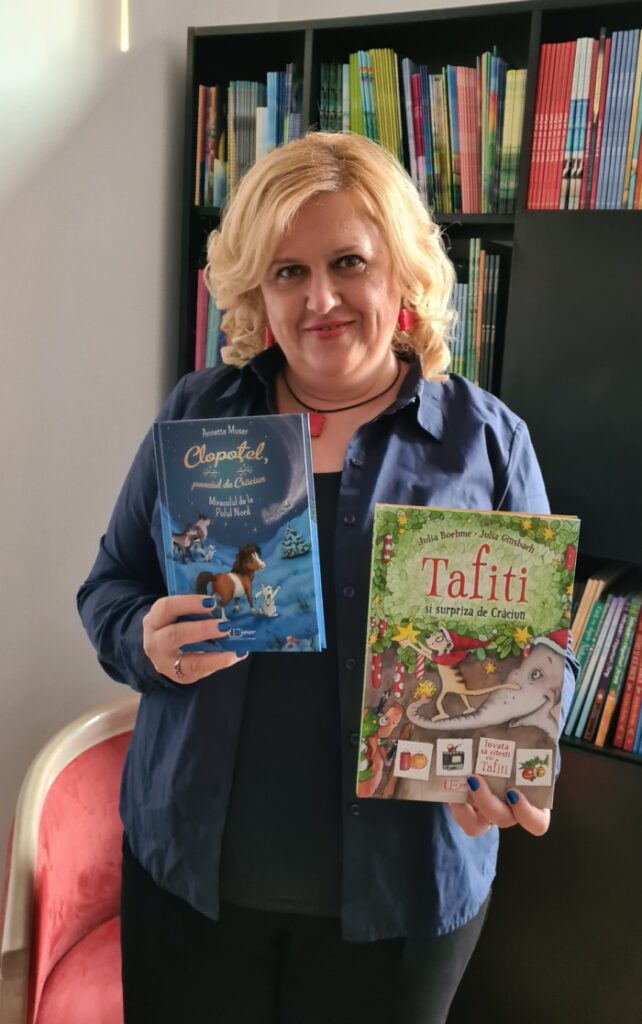
For those less familiar with what selling translation rights means, could you explain how a book goes from the manuscript to the original language on the online or offline shelves of Romanian bookstores?
As a sub-agent, I represent a number of foreign publishers in Romania. They usually send me catalogues with new titles (printed or emailed booklets) in spring and autumn, which I study and forward to the publishers in the form of newsletters or printed copies. Out of these I make a selection and suggest to each publisher what I think suits them, depending on their portfolio of titles, relying also on what they have previously contracted. Sometimes come out books written by the same author or designed by the same illustrator, that have been published by a particular publisher. Naturally, that publisher has the first choice of translation and publication. In children's books, however, some prolific authors and illustrators can be found in the portfolios of several publishers. Often Romanian publishers are the ones who ask me about certain titles. After evaluating them, they can make the publishing decision and send me an offer, which I negotiate and, if accepted, they conclude a licensing contract with the publisher or agency abroad, which again I intermediate. Under this contract, the Romanian publisher has the exclusive right to translate, publish and distribute the book in question for a limited period (usually 5 years) and must abide by certain conditions. Once the contract is signed and the copyright paid, the book is given in translation. Following this, the usual steps of any book are carried out: editing, proofreading, typesetting, printing, promotion and distribution.
Publishers send me the statement of the book's publication and ship the free copies to the authors. Next, I manage the licensing contracts throughout their term and send out annual sales reports drafted by the publishers. I frequently help promote the book as well, introducing new releases on my Facebook page, Marilena Iovu Literary Agency, and keeping in touch with bloggers.
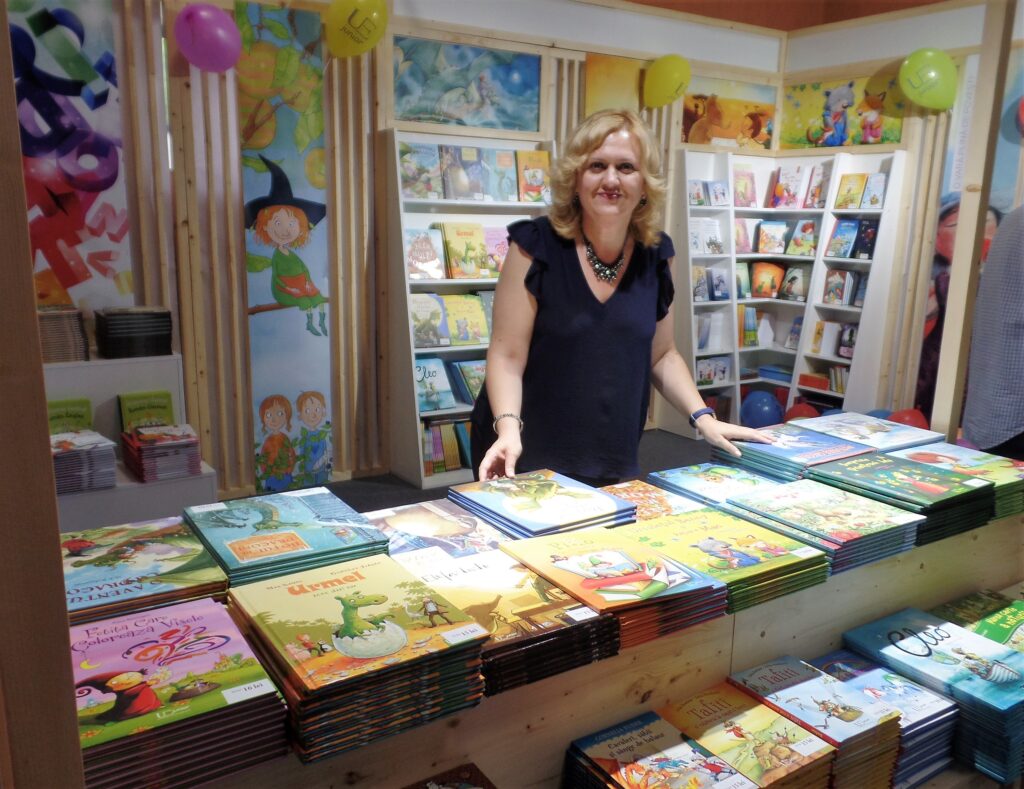
Which title or series are you most proud of selling? And which is your agency's bestseller (as far as I can tell, the Conni series published by Casa can make any agent envious; I am speaking from experience
I am proud of each and every one of these; many of them have a story behind. For Lindbergh, the first book in the series created by Torben Kuhlman, published by Corint, I struggled for more than a year to sell the rights, then suddenly publishers became interested, I got three offers at the same time and the book sold at auction, then turned into a series that has been very successful. Jill Tomlinson's series was requested by a publisher who made an offer, then withdrew it as the books were considered too old (they had been published in 1968). After that, Nemira decided to publish them and made them bestsellers and currently longsellers, with the contract extended for another five years. Since you mentioned Conni series, this series, which is now 30 years old, was also sold at auction. As you can see, Editura Casa has done its job quite well, publishing no less than 38 titles in the last four years — some of these have been reprinted several times. Other highly successful series in the agency's portfolio are: Die Schule der magischen Tiere (The School of Magic Animals)published by Litera, Pauli (the books with bunny Matei), published by Nemira, Tafiti series (which I have also translated), published by Univers Enciclopedic, Winston the Cat books from Booklet, the Rabbit and Bear series from DPH, Kleine Wir (Little Us) and Zoo, published by Univers or Pixi Wissen (Pixi knows everything) from ALL. The best-selling series in 2021 were Emotiile Sarei (Les emotions de Moune) and the bullying collection published by Bookzone.
From the outside, it looks like you're the closest agent to the editors. You visit them at the office, meet them at trade fairs, book clubs or other literary gatherings around town. A personal trademark of yours are the self-made cake tins you serve your friends and associates in the publishing world. How much do personal relationships matter in a field like copyright and how do you manage to keep the balance between friends and business partners?
I'm a sociable being, yes. By visiting publishers, I combine pleasure with business: I get away from home, I meet people and, from word to word, I find out what everyone is looking for. This gives me a better idea of what to offer them. We look through catalogues, leaf through books or electronic manuscripts and then the contracting decisions are made quite quickly. You're right, I get along pretty well with most publishers and I also like to spoil them with cakes I bake at book fairs, holidays or various events. There are also situations when I have to decide whether a title will end up with one publisher or another, or the owner asks my opinion if I receive two similar offers. Even though I am friends with the editors of both publishing houses, these decisions are always taken professionally, in cold blood: the contract will be with the publisher whose portfolio is the best fit for the book and who, at least in theory, will translate, edit, publish and promote it in the best conditions.
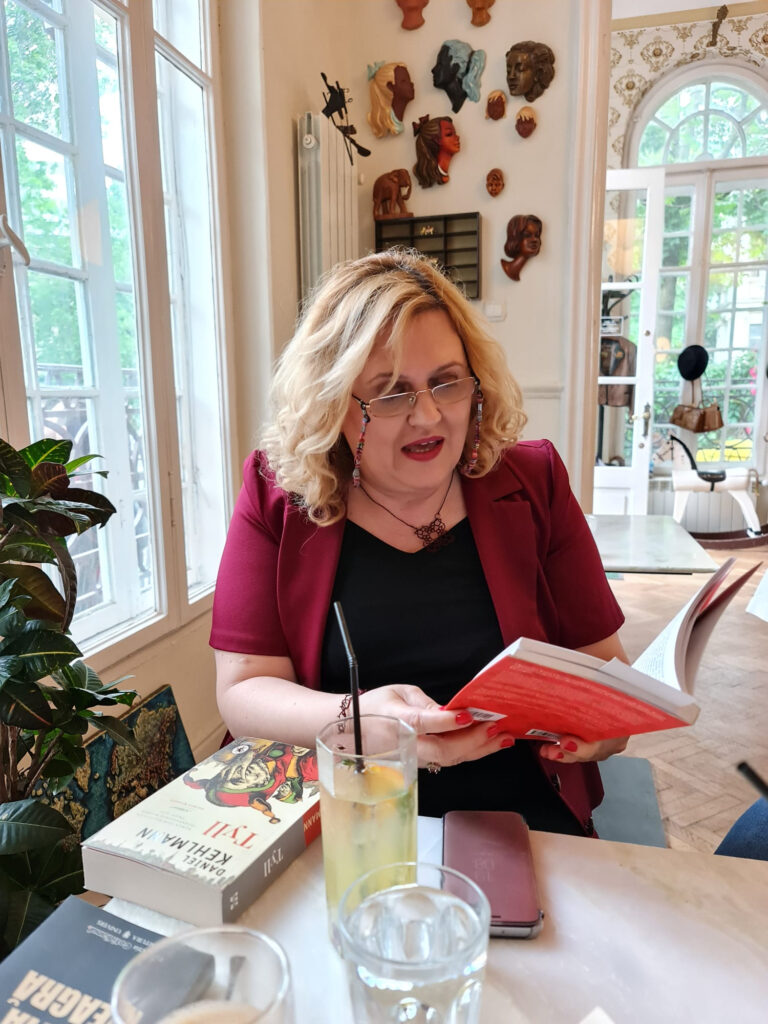
I imagine you have attended many international book fairs in your 8 years of working at the agency and before. What was your first one and what was it like?
The first international book fair I attended was in Frankfurt in 2004, when I was working at ALL Publishing House. You know what it's like when you go there for the first time: it's overwhelming, it changes your perspective. I had been to an international fair in Zagreb when I was working in foreign trade, but it was nothing like this one. I attended a few meetings with Carmen and Mihai Penescu, but I mostly held them alone. Unaware of the distances that awaited me there and unsuspecting of the frenetic pace of the meetings keeping my eyes on the clock, I decided to wear high heels. After three days of going back and forth between halls 8, 5 and 6, still loaded with bags of catalogues, I was exhausted and hardly knew how to smile. While people were hugging and laughing at the stands as if they were old friends, I was just shaking hands with my partners. That was until I approached a French editor who kissed me on the cheeks, probably caught up in the atmosphere of the fair, as we were seeing each other for the first time. At another meeting, the American publisher, very nervous, told me in detail how he had met a Chinese publisher, who had signed a licensing contract for a book, but had published it in China, in English. He had sold several tens of thousands of copies, of course, without having the right to do so and without paying the copyright. You could also see Chinese publishers photographing books page by page at the stands. I remember the moments of rest on the stairs of the magnificent atrium between halls 8 and 9, where an artist was playing the marimbaphone. I was impressed by the stands, especially by those of the big publishing houses. I returned home excited, full of promotional ideas. You know the feeling: in Frankfurt everything seems possible and when you see the books you want to print them all. Then I attended the fairs in London and Turin. Nowadays, as an agent, I attend two international fairs: Frankfurt and Bologna.
You are also a translator from English and German. How did you start translating? Which of the titles purchased by publishers through your agency end up on your translation desk?
I became an English translator for pleasure and a German translator for need. Translating has been a passion for as long as I can remember. In primary school I used to read the few foreign books for children, I went to English and French Olympiads, I loved writing foreign language essays (I was also writing them for my classmates) and on holidays I was translating anything that came my way that was in a foreign language (that was something rare in the communist period). When I was a student, I took the exam and got my translator's certificate from the Ministry of Culture in the field of economics (I graduated from ASE). Later I was also authorized as an interpreter and translator by the Ministry of Justice. At university I translated hundreds of pages of specialist books. But the first published translations were at ALL, under the guidance of the late editor, the poet Augustin Frățilă. After a few Helen Exley books (the ones with quotes) and nonfiction, the first novel I dared to translate was P.S. I Love You, Cecelia Ahern's debut novel, published by ALLFA Publishing in 2005. I have evolved as a translator together with the author. The Marble Collector, the author's tenth novel I have translated, was published recently.
Nowadays I translate almost exclusively from German the books whose rights I also negotiate. I think there are over two hundred, I have lost track of them. I started by doing sample translations that were appreciated by publishers and then I never stopped translating, partly because there are fewer translators from German compared to English or French. Because my German is average, I only translate short children's stories and illustrated novels. The fact that I can translate books quickly is an extra reason for some publishers to sign a licensing agreement, so the translations help my business too. I like alternating between the demanding, fast-paced life as a literary agent and the moments when I sit and cram a translation, the only hassle being figuring out the most appropriate words and phrases.
What are the greatest satisfactions that the agency and the work as an agent have brought you so far? What about the most challenging situations?
I love to delight others with my work. I live in the world of stories, where there are no deadlines or targets. I work with joy from the moment I open my eyes in the morning, as long as my strength lasts, until the letters play before my eyes and the moon shines in the sky. When I lay my head on my pillow I fall asleep smiling, happy with what I have managed to do that day, happy that tomorrow other projects await me, at the end of which other children will fall asleep listening to enchanted stories, will manage to fulfil their dreams of reading or counting, will get rid of their fears, will learn something new, will identify with the characters in the books. I have turned my passion into a profession and I am happy that now, eight years after the agency was set up, I am busily extending the validity for many of the contracts concluded in the first few years of activity. Challenges? I hope I don't collapse under the burden of success, because I have more and more work to do year after year and I'm just one human being.
Until recently, the pandemic opened and closed most discussions between people in the book industry. Now it seems the war in Ukraine has taken its place. How much did first the pandemic and then the war influence the agency's fortunes?
2019 had been a very good year and 2020 had started under the same high spirits, with many great projects and plans for development, but that spring the number of new contracts I intermediated dropped by about 70%, as the publishing houses’ activity was reduced due to thinning income caused by the shutdown of physical bookstores. At the end of 2020 the agency's earnings were down just 17% in regard to the previous year — a much better result than I expected. It must be said that the children's book market was less affected by the pandemic: publishers adapted along the way and parents, unable to go anywhere with their little ones, needed alternative ways to spend their time, ordering online storybooks, activities and educational games. In 2021, although the number of new contracts was lower than in 2019, agency income increased by 35% compared to 2020, and by 19% compared to 2019, mainly due to reprints. We all thought the worst was over, but in 2022 the outbreak of the conflict in Ukraine hit publishers' sales again; as far as I know they haven't recovered along the way, and there's a serious order drought in the summer anyway. The pandemic and the war have worsened the paper crisis - its price has doubled since last year. On top of that, the world economy, not just ours, is facing high increase in fuel, electricity and gas costs. For these reasons, the agency's business is no longer effervescent, with publishers showing restraint. Not surprisingly, sales are weak and with printing costs rising week by week, publishers fear that at the high prices their books will be selling for, buyers will be turning away. Still, you know what they say, if a problem can be fixed, there's no point in worrying. And if it can't be solved, there's no point in worrying. Books will find a way to get into the hands of the readers.
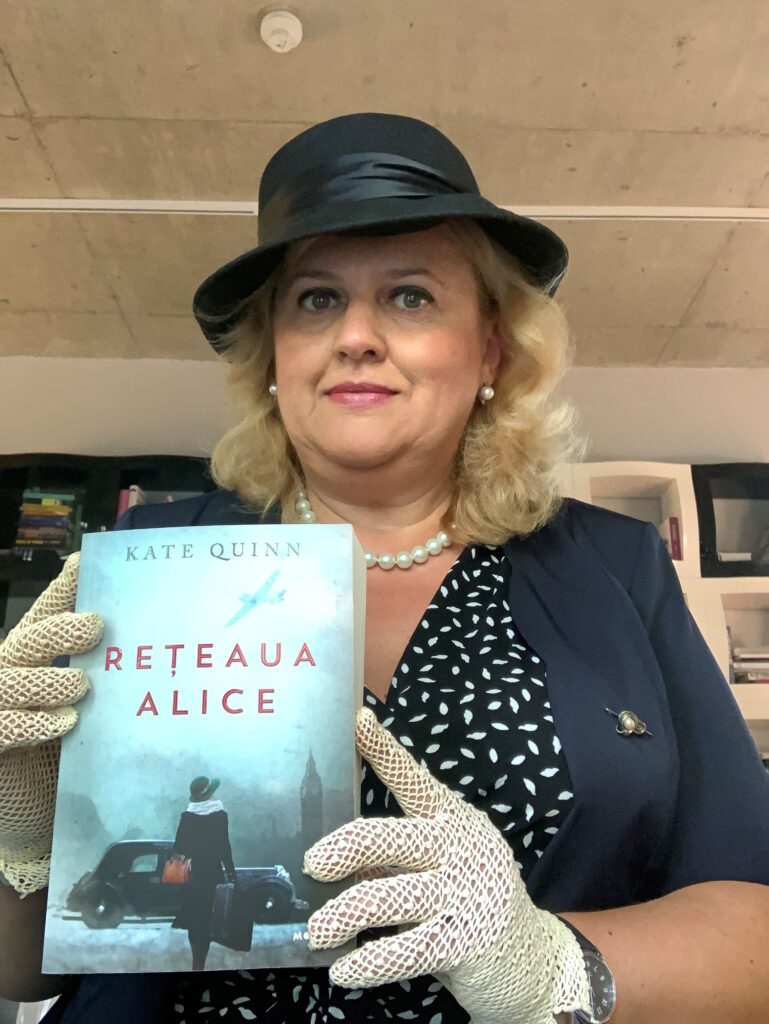
You're a certified reader with many book clubs under your belt. What are your literary discoveries of late and what will you be taking with you on your summer holiday?
I'm in love with books and even though, by the nature of my job, I read every day, reading for pleasure is one of my hobbies. I participate in a couple of book clubs, where there are passionate discussions, and sometimes, when there's a controversial title and arguments get heated, you just feel like everyone else has read a different book than you! Sometimes I absolutely love what I read. I've discovered authors like Richard Flanagan, Doina Ruști, Maylis de Kerangal, Eric Vuillard, Domenico Starnone, Karl Ove Knausgard, A.J. Kazinski and E.L. Doctorow at book clubs. And since last year I've caught the Anansicollection fever too, reading books one by one. For holidays I choose 4-5 books, that's all I manage to read in a week by the seaside. Usually they are light books or ones I want to read at leisure. For this holiday I have prepared Tyll by Daniel Kehlmann (which I have to read for a book club), Nume de cod: Tradafirul (The Rose Code) by Kate Quinn (historical war novel, I love the author), O vară italiană (One Italian Summer) (a magical and touching story) by Rebecca Serle, Când amintirile noastre vor veni să danseze (Quand nos souvenirs viendront danser) by Virginie Grimaldi (one of my favorite authors who writes bittersweet stories), Rivali în croazieră (Shipped) by Angie Hockman (I picked it after the title, I don't know what I'm in for) and Toate greșelile care se pot face (All the Mistakes That Can Be Made) by Cătălin Pavel (author of the stunning bestseller The Archaeology of Love). You know what they say about books, they're both the destination and the journey. Because I spend my summer holidays mostly at the beach, I would add that, for me, books are like a sea on which you can sail wherever you see!
[The photos are part of Marilena Iovu’s personal archive.] [Translated into English by Maria Bucșea.]

